Citroen C4 CACTUS 2016 1.G Owner's Manual
Manufacturer: CITROEN, Model Year: 2016, Model line: C4 CACTUS, Model: Citroen C4 CACTUS 2016 1.GPages: 308, PDF Size: 7.96 MB
Page 181 of 308
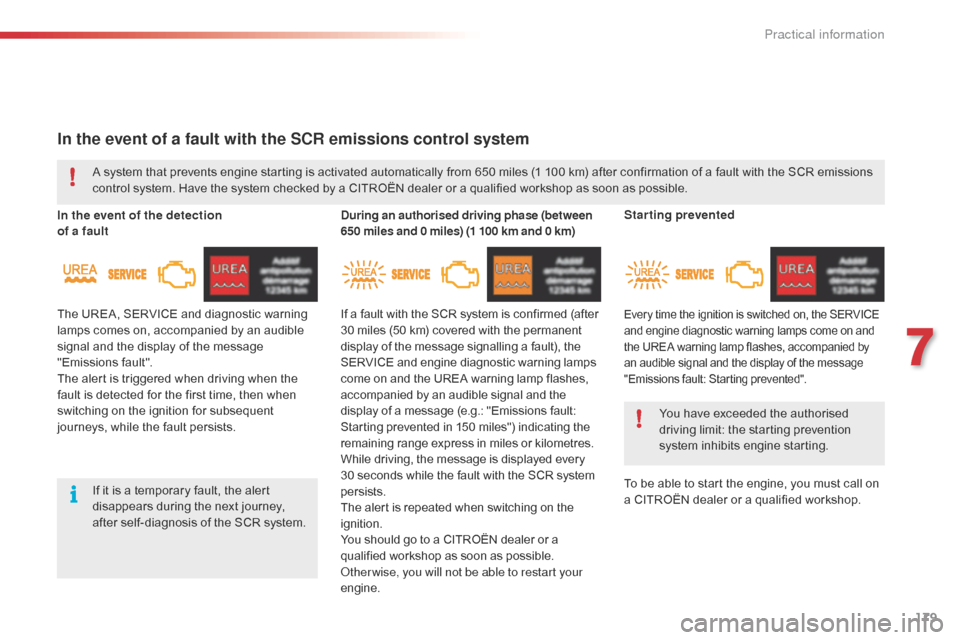
179
In the event of a fault with the SCR emissions control system
In the event of the detection
of a faultDuring an authorised driving phase (between
650 miles and 0 miles) (1 100 km and 0 km)
A
system that prevents engine starting is activated automatically from 650 miles (1 100 km) after confirmation of a fault with the SCR emissions
c
ontrol system. Have the system checked by a CITROËN dealer or a qualified workshop as soon as possible.
If it is a temporary fault, the alert
d
isappears during the next journey,
a
fter self-diagnosis of the SCR system.
The
UREA, SERVICE and diagnostic warning
l
amps comes on, accompanied by an audible
s
ignal and the display of the message
"
Emissions
f
ault".
The
alert is triggered when driving when the
f
ault is detected for the first time, then when
s
witching on the ignition for subsequent
j
ourneys, while the fault persists. If
a fault with the SCR system is confirmed (after
3
0 miles (50 km) covered with the permanent
d
isplay of the message signalling a fault), the
S
ERVICE and engine diagnostic warning lamps
c
ome on and the UREA warning lamp flashes,
a
ccompanied by an audible signal and the
d
isplay of a message (e.g.: "Emissions fault:
S
tarting prevented in 150 miles") indicating the
r
emaining range express in miles or kilometres.
While
driving, the message is displayed every
3
0 seconds while the fault with the SCR system
p
ersists.
The
alert is repeated when switching on the
ig
nition.
You
should go to a CITROËN dealer or a
q
ualified workshop as soon as possible.
Other wise, you will not be able to restart your
engine. Starting prevented
To
be able to start the engine, you must call on
a
CITROËN dealer or a qualified workshop.
You
have exceeded the authorised
d
riving limit: the starting prevention
s
ystem inhibits engine starting.
Every time the ignition is switched on, the SERVICE and engine diagnostic warning lamps come on and t
he UREA warning lamp flashes, accompanied by
a
n audible signal and the display of the message
"
Emissions fault: Starting prevented".
7
Practical information
Page 182 of 308
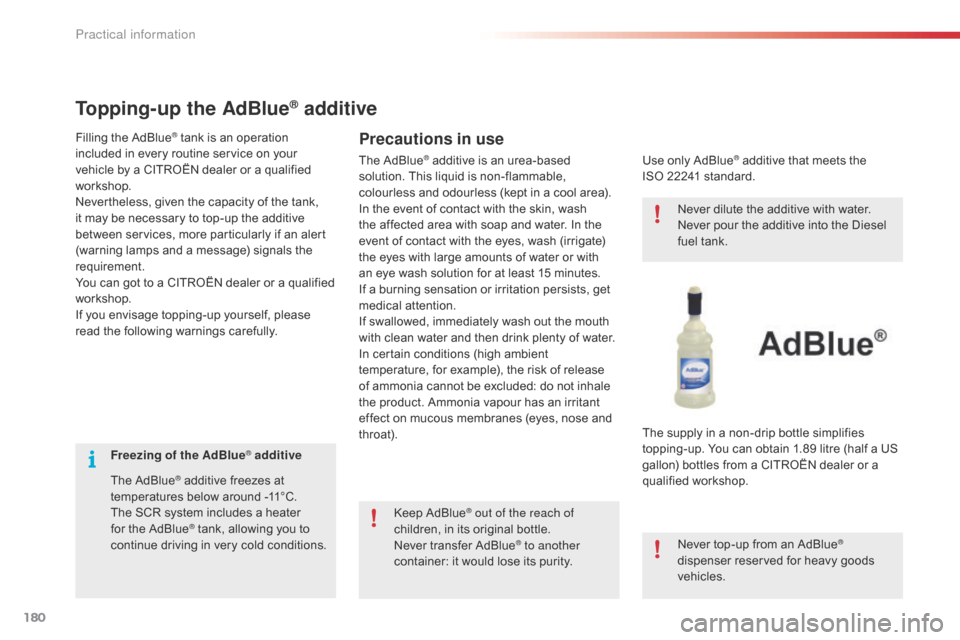
180
Freezing of the AdBlue® additive
The
AdBlue
® additive freezes at t
emperatures below around -11°C.
The
SCR
system includes a heater
f
or
the
AdBlue
® tank, allowing you to c
ontinue
driving in very cold conditions.
Topping-up the AdBlue® additive
Precautions in useFilling the AdBlue® tank is an operation i
ncluded
in
every
routine service on your
v
ehicle
by
a
CITROËN dealer or a qualified
w
orkshop.
Nevertheless,
given the capacity of the tank,
i
t
may
be
necessary to top-up the additive
b
etween
services,
more particularly if an alert
(
warning
lamps
and a message) signals the
r
equirement.
You
can
got
to
a
CITROËN dealer or a qualified
w
orkshop.
If
you
envisage
topping-up yourself, please
r
ead
the
following
warnings carefully. Keep
AdBlue
® out of the reach of
children,
in
its
original bottle.
Never
transfer AdBlue
® to another
container:
it
would
lose
its purity. Never
dilute the additive with water.
Never pour the additive into the Diesel
f
uel tank.
Never top-up from an AdBlue®
dispenser
reserved
for
heavy
goods
v
ehicles.
Use
only
AdBlue
® additive that meets the I
SO 22241
standard.
The
supply
in
a
non-drip bottle simplifies
t
opping-up.
You
can obtain 1.89 litre (half a US
g
allon)
bottles
from a CITROËN dealer or a
q
ualified
w
orkshop.
The
AdBlue® additive is an urea-based s
olution.
This liquid is non-flammable,
c
olourless
and odourless (kept in a cool area).
In
the
event
of contact with the skin, wash
t
he
affected
area with soap and water. In the
e
vent
of
contact with the eyes, wash (irrigate)
t
he
eyes
with large amounts of water or with
a
n
eye
wash
solution for at least 15 minutes.
I
f
a
burning
sensation or irritation persists, get
m
edical
attention.
If
swallowed, immediately wash out the mouth
w
ith
clean
water and then drink plenty of water.
In
certain
conditions (high ambient
t
emperature,
for example), the risk of release
o
f
ammonia
cannot be excluded: do not inhale
t
he
product.
Ammonia vapour has an irritant
e
ffect
on
mucous membranes (eyes, nose and
t
hroat).
Practical information
Page 183 of 308
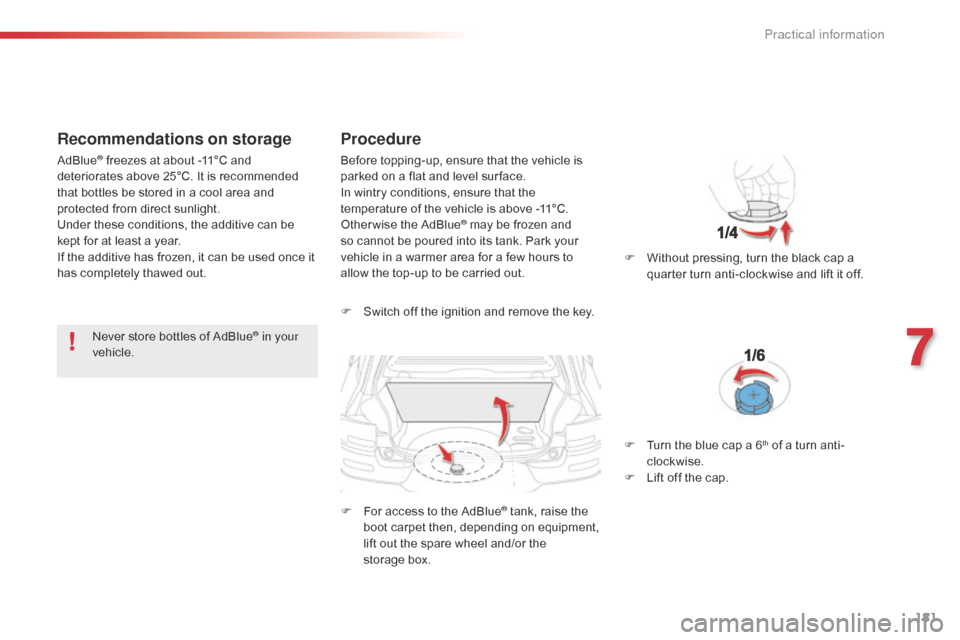
181
Recommendations on storage
Never store bottles of AdBlue® in your
vehicle.
Procedure
F Switch off the ignition and remove the key.
F
F
or access to the AdBlue
® tank, raise the b
oot
carpet
then,
depending on equipment,
l
ift
out
the
spare
wheel
and/or the
s
torage box. F
W
ithout pressing, turn the black cap a
q
uarter turn anti-clockwise and lift it off.
AdBlue
® freezes at about -11°C and d
eteriorates above 25°C. It is recommended
t
hat
bottles be stored in a cool area and
p
rotected from direct sunlight.
Under
these conditions, the additive can be
k
ept
for
at least a year.
If
the
additive has frozen, it can be used once it
h
as
completely thawed out. Before
topping-up, ensure that the vehicle is p
arked on a flat and level sur face.
In
wintry conditions, ensure that the
t
emperature of the vehicle is above -11°C.
O
therwise
t
he
A
dBlue
® may be frozen and s
o
cannot
be
poured
into its tank. Park your
v
ehicle
in
a
warmer
area for a few hours to
a
llow
the
top-up
to
be
carried out.
F
T
urn the blue cap a 6
th of a turn anti-
c
lockwise.
F
L
ift
off
the
cap.
7
Practical information
Page 184 of 308
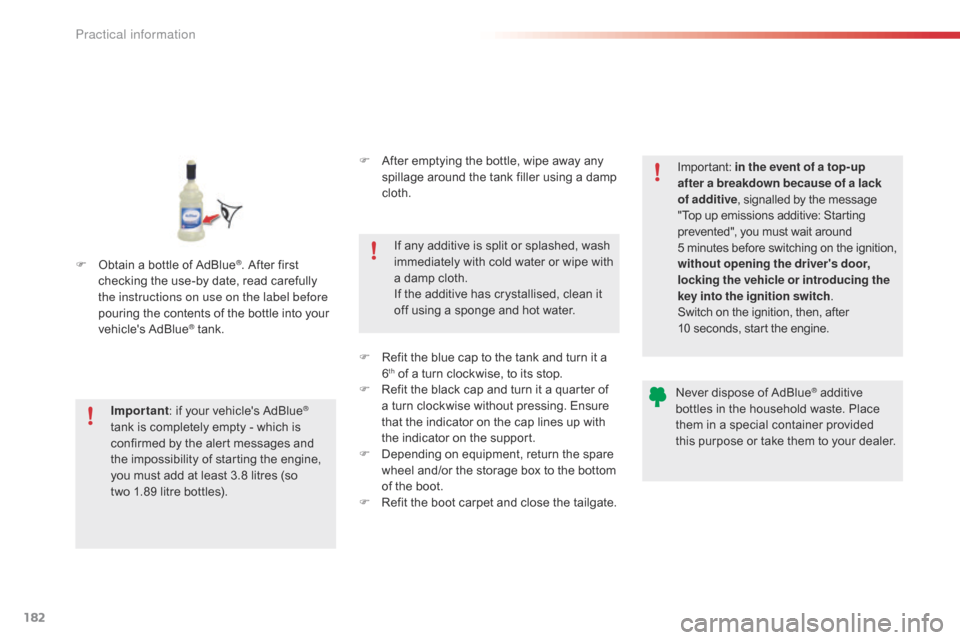
182
F Obtain a bottle of AdBlue®. After first c
hecking
the
use-by
date,
read carefully
t
he instructions on use on the label before
pouring
the
contents
of
the bottle into your
v
ehicle's
Ad
Blue
® tank.
I
mportant :
if
your vehicle's AdBlue
®
tank
is
completely
empty
-
which
is
c
onfirmed
by
the
alert
messages
and
t
he
impossibility
of
starting
the
engine,
y
ou
must
add
at
least
3.8
litres
(so
t
wo 1.89
litre
bottles). If
any additive is split or splashed, wash
i
mmediately
w
ith
c
old
w
ater
o
r
w
ipe
w
ith
a
damp cloth.
If the additive has crystallised, clean it
o
ff using a sponge and hot water.Important:
i
n the event of a top-up
after a breakdown because of a lack
of additive , signalled by the message
"
Top up emissions additive: Starting
p
revented", you must wait around
5
minutes
before
switching
on
the
ignition,
w
ithout opening the driver's door,
locking the vehicle or introducing the
key into the ignition switch .
Switch on the ignition, then, after
1
0 seconds, start the engine.
Never dispose of AdBlue
® additive b
ottles
in
the
household
waste. Place
t
hem
in
a
special
container provided
t
his
p
urpose
o
r
t
ake
t
hem
t
o
y
our
d
ealer.
F
A
fter
emptying
the
bottle,
wipe
away
any
s
pillage
around
the
tank
filler
using
a
damp
c
loth.
F
R
efit
the
blue
cap
to
the
tank
and
turn
it
a
6th of a turn clockwise, to its stop.
F
R
efit the black cap and turn it a quarter of
a
turn clockwise without pressing. Ensure
t
hat the indicator on the cap lines up with
t
he indicator on the support.
F
D
epending on equipment, return the spare
w
heel and/or the storage box to the bottom
o
f
the boot.
F
R
efit the boot carpet and close the tailgate.
Practical information
Page 185 of 308
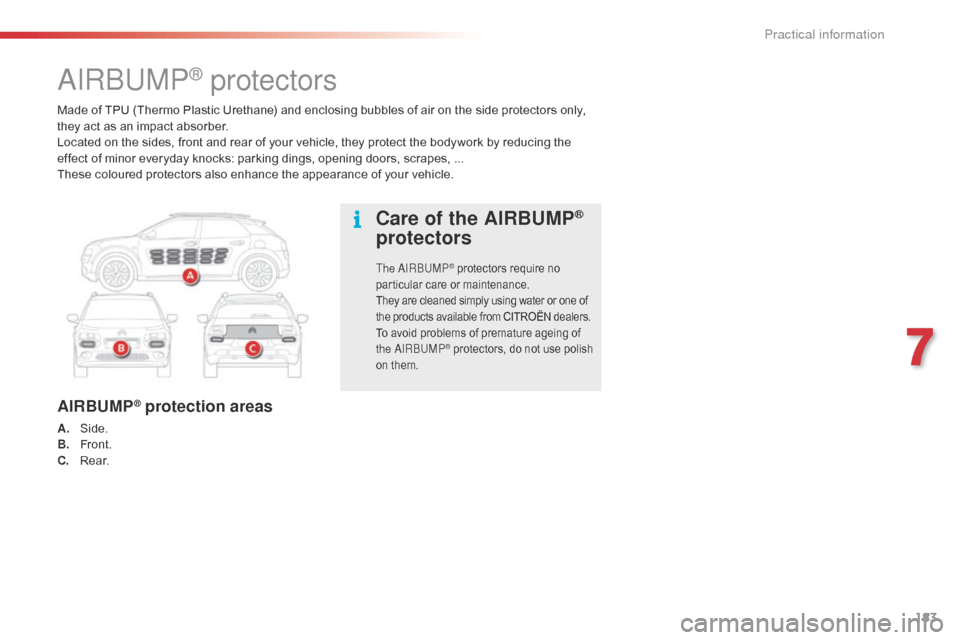
183
Made of TPU (Thermo Plastic Urethane) and enclosing bubbles of air on the side protectors only, they act as an impact absorber.
Located
on the sides, front and rear of your vehicle, they protect the bodywork by reducing the
e
ffect of minor everyday knocks: parking dings, opening doors, scrapes, ...
These
coloured protectors also enhance the appearance of your vehicle.
AIRBUMP® protectors
AIRBUMP® protection areas
A. Side.
B. Front.
C.
R
e a r.
Care of the AIRBUMP®
protectors
The AIRBUMP® protectors require no par
ticular c
are o r m aintenance.
They
are
cleaned simply using water or one of
t
he
products
available from CITROËN dealers.
To
avoid
problems of premature ageing of
t
he AIRBUMP
® protectors, do not use polish o
n
them.
7
Practical information
Page 186 of 308
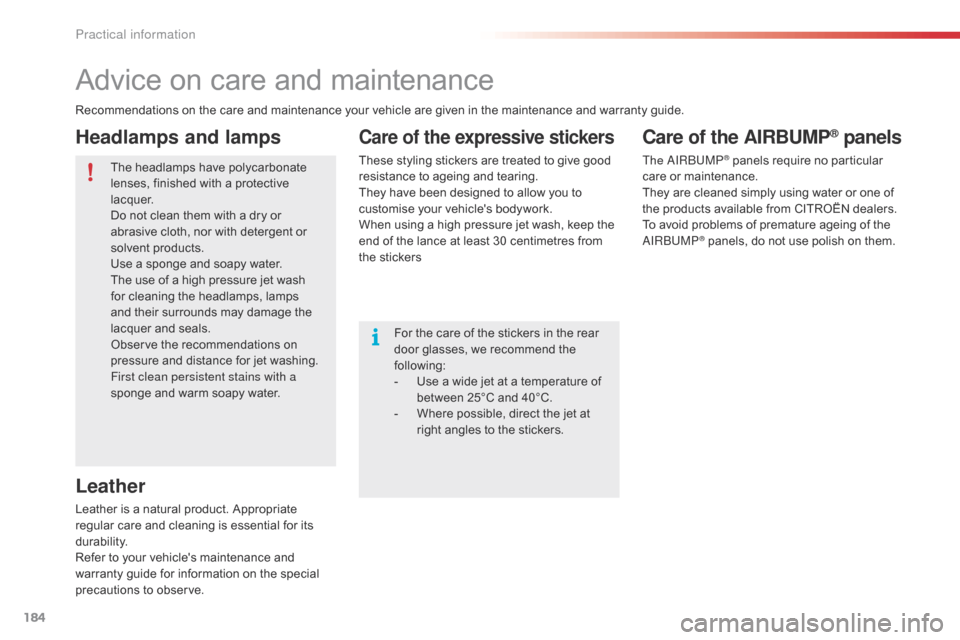
184
Advice on care and maintenance
Recommendations on the care and maintenance your vehicle are given in the maintenance and warranty guide.
T he headlamps have polycarbonate
l
enses, finished with a protective
l
a c q u e r.
Do
not clean them with a dry or
a
brasive cloth, nor with detergent or
so
lvent
pro
ducts.
Use
a sponge and soapy water.
The
use of a high pressure jet wash
f
or cleaning the headlamps, lamps
a
nd their surrounds may damage the
l
acquer and seals.
Observe
the recommendations on
p
ressure and distance for jet washing.
First clean persistent stains with a
sponge
and warm soapy water.For
the care of the stickers in the rear
d
oor glasses, we recommend the
fo
llowing:
-
U
se a wide jet at a temperature of
b
etween 25°C and 40°C.
-
W
here possible, direct the jet at
r
ight angles to the stickers.
Leather
Care of the expressive stickers
These styling stickers are treated to give good resistance to ageing and tearing.
They
have been designed to allow you to
c
ustomise your vehicle's bodywork.
When
using a high pressure jet wash, keep the
e
nd of the lance at least 30 centimetres from
t
he stickers
Leather
is
a
natural
product.
Appropriate
r
egular
care
and
cleaning
is
essential
for
its
du
rability.
Refer
to
your
vehicle's
maintenance
and
w
arranty
guide
for
information
on
the
special
p
recautions
to
observe.
Headlamps and lamps Care of the AIRBUMP® panels
The AIRBUMP® panels require no particular c
are o
r m
aintenance.
They
are
cleaned simply using water or one of
t
he
products
available from CITROËN dealers.
To
avoid
problems of premature ageing of the
A
IRBUMP
® panels, do not use polish on them.
Practical information
Page 187 of 308
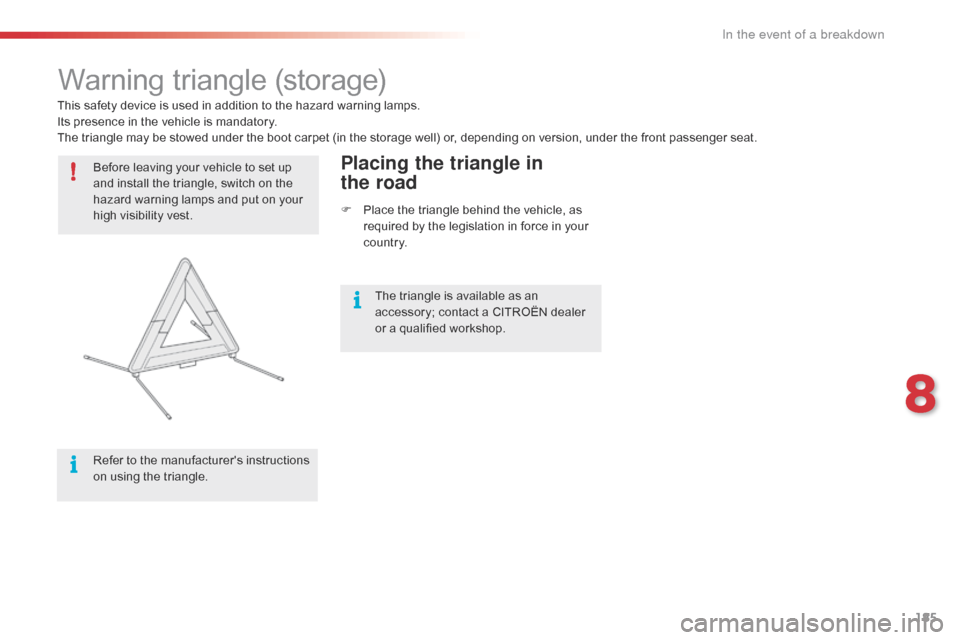
185
Warning triangle (storage)
Before leaving your vehicle to set up a
nd install the triangle, switch on the
h
azard warning lamps and put on your
h
igh visibility vest.
Refer
to the manufacturer's instructions
o
n using the triangle.Placing the triangle in
the road
F Place the triangle behind the vehicle, as r
equired by the legislation in force in your
c
o unt r y.
This
safety
device
is
used
in
addition
to
the
hazard
warning lamps.
Its
presence
in
the
vehicle
is
mandatory.
The
triangle
may
be
stowed
under
the
boot
carpet
(in the storage well) or, depending on version, under the front passenger seat.
The triangle is available as an
a
ccessory; contact a CITROËN dealer
o
r a qualified workshop.
8
In the event of a breakdown
Page 188 of 308
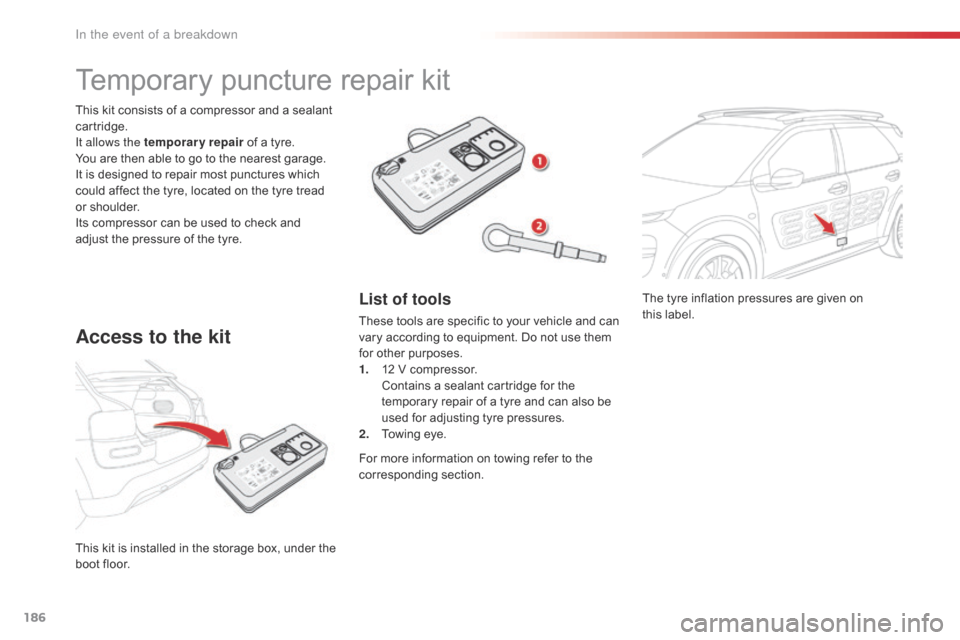
186
The tyre inflation pressures are given on this label.
This
k
it
i
s
i
nstalled
i
n
t
he
s
torage
b
ox,
u
nder
t
he
b
oot
floor.
This
kit
consists
of
a
compressor
and
a
sealant
c
artridge.
It allows the temporary repair
of
a
tyre.
You
are
then
able
to
go
to
the
nearest
garage.
It
is
designed
to
repair
most
punctures
which
c
ould
affect
the
tyre,
located
on
the
tyre
tread
o
r
shoulder.
Its
compressor
can
be
used
to
check
and
a
djust
the
pressure
of
the
tyre.
Temporary pu
ncture r epair k it
Access to the kit
List of tools
These tools are specific to your vehicle and can v
ary according to equipment. Do not use them
f
or other purposes.
1.
1
2 V compressor.
C
ontains a sealant cartridge for the
t
emporary repair of a tyre and can also be
u
sed for adjusting tyre pressures.
2.
T
owing eye.
For
more information on towing refer to the
c
orresponding
s
ection.
In the event of a breakdown
Page 189 of 308
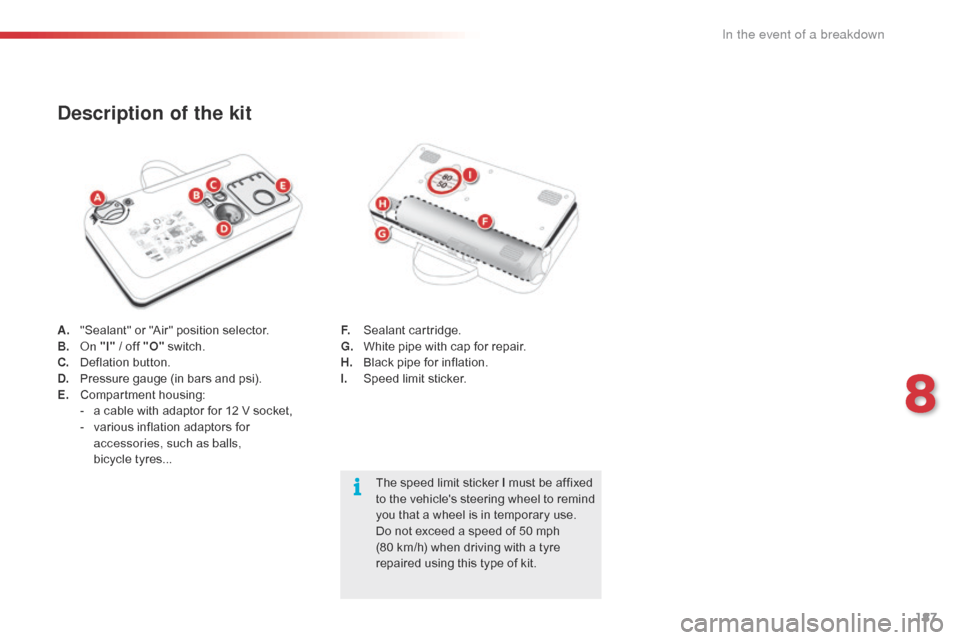
187
A. "Sealant" or "Air" position selector.
B. On "I"
/ off "O" s witch.
C.
D
eflation button.
D.
P
ressure gauge (in bars and psi).
E.
C
ompartment
h
ousing:
-
a
cable with adaptor for 12 V socket,
-
v
arious inflation adaptors for
a
ccessories, such as balls,
bicycle tyres...
Description of the kit
The speed limit sticker I must be affixed t o the vehicle's steering wheel to remind
y
ou that a wheel is in temporary use.
Do
not exceed a speed of 50 mph
(
80 km/h) when driving with a tyre
r
epaired using this type of kit.
F.
S
ealant
c
artridge.
G.
W
hite pipe with cap for repair.
H.
B
lack pipe for inflation.
I.
S
peed limit sticker.
8
In the event of a breakdown
Page 190 of 308
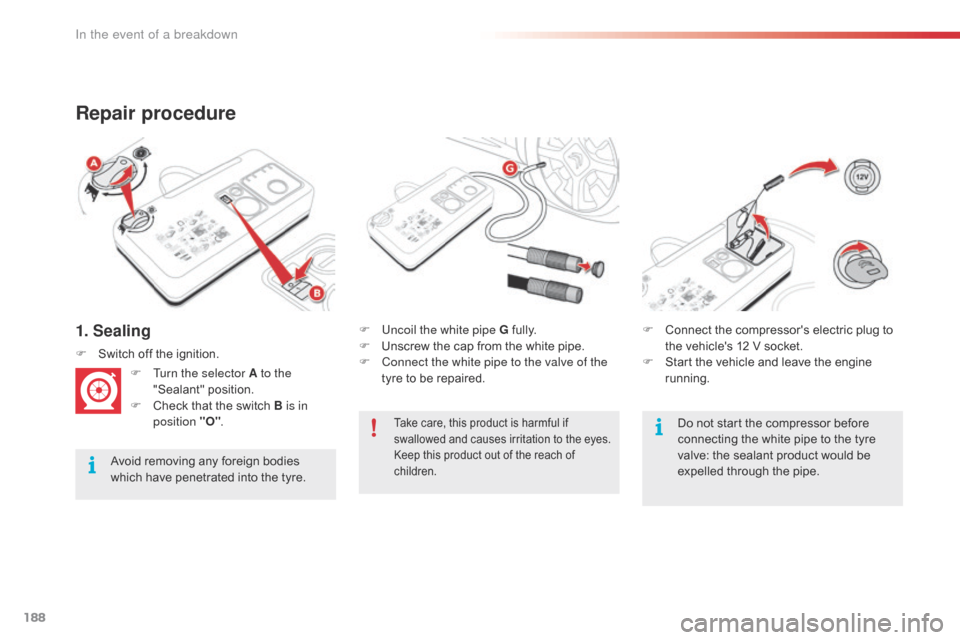
188
1. Sealing
Repair procedure
Avoid removing any foreign bodies which have penetrated into the tyre.F
U
ncoil the white pipe G
f
ully.
F
U
nscrew the cap from the white pipe.
F
C
onnect the white pipe to the valve of the
tyre to be repaired.
F
S
witch off the ignition.
F
T
urn the selector A to the
"Sealant"
p
osition.
F
C
heck that the switch B is in
position "O" . F
C
onnect the compressor's electric plug to
t
he vehicle's 12 V socket.
F
S
tart the vehicle and leave the engine
r
unning.
Take care, this product is harmful if s
wallowed and causes irritation to the eyes.
Keep
this product out of the reach of
c
hildren.Do not start the compressor before c onnecting the white pipe to the tyre
v
alve: the sealant product would be
e
xpelled through the pipe.
In the event of a breakdown